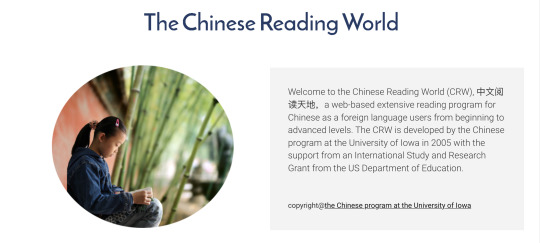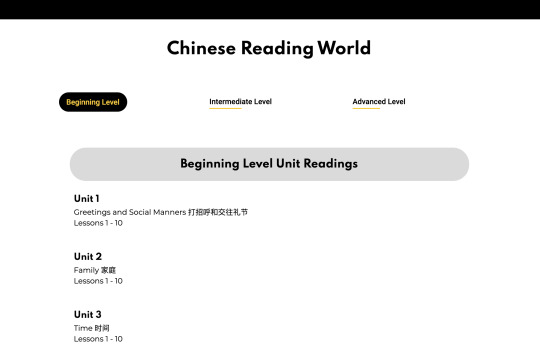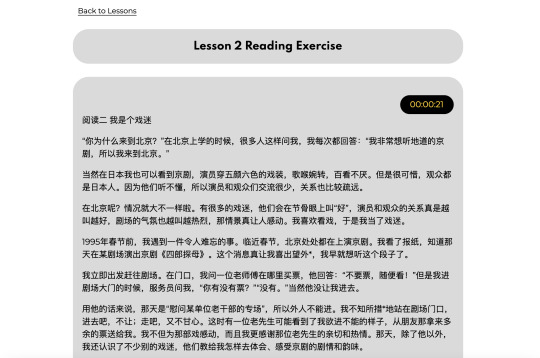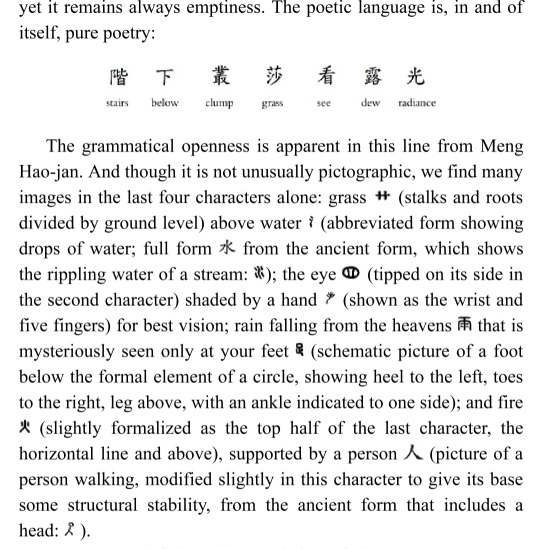Text
A Study Plan for Chinese to HSK 4, then Chinese Content
A study plan to get you to the point you can do something in Chinese, like read novels or watch shows, in 1-2 years.
For Chinese, it is very possible to study HSK 1-3 in a year, then HSK 4 the next year, and then be reading and watching whatever you want by the end of year 2. This could be achieved with a pace of studying around 1 hour a day. As long as you're willing to look up key unknown words to understand the main idea, when reading and watching whatever you want.
In fact, it's possible to study up to HSK 4 in 8 months, this person did it. If you really wanted to study everything up to HSK 4 in that amount of time.
I studied roughly the amount in HSK 4: I read through 800 hanzi entries from an HSK 1-3 Tuttle book (available in many libraries and elibraries for free, alternatively there's a free app Hanly to learn hanzi with mnemonics), all the grammar points on hskcourse.com, cram studied 2000 common chinese words in Ben Whatley memrise decks (anyone looking to do something similar: I suggest doing the first 2000 sentences in Chinese Spoonfed Anki deck, or finding another 2000 common words collection with audio and hanzi), then read a few Mandarin Companion Graded Readers in Pleco app (where I could click unknown words for a translation and pronunciation). I did all of that in roughly 10 months, at ~2 hours of study a day, so not a huge time commitment.
After I could read around ~1000 hanzi, I could move onto reading manhua, whatever webnovels I wanted in Pleco and Readibu apps (I'd recommend Heavenly Path's Comprehensive Reading Guide for more information on how to start reading, and their general site for recommendations at various reading levels), and any cdramas I wanted (using Google Translate and Pleco to look up any unknown words that seemed important to understanding the main idea of a scene, alternatively there's dual subtitle extensions like LanguageReactor that make looking up words easier).
Why aim for HSK 4? HSK 4 has a lot of overlap with the most common words lists, and includes a lot of basic grammar, so either focusing on learning what's in HSK 4 OR a common word list and basic grammar guide, would get you a baseline of knowledge you can then use to start reading/watching whatever you want (if you look up key unknown words).
HSK 4 will get you around A2/B1 level, upper beginner/lower intermediate, and from there you can start just reading and watching things you want. This is the level you want to reach, to be able to start doing things in the language. Once you can do things in the language, it's easier to stay motivated for years, because you can start DOING your goals, and improving at your goals in the language.
You can either look up key unknown words (which unlocks virtually all stuff made in Chinese), or you can continue with Graded Readers (Mandarin Companion, Rainbow Bridge Readers, Sinolingua, Imagin8 Press, etc.), Comprehensible Input Lessons (Lazy Chinese, Blabla Chinese, Xiaogua, list of more), podcasts for learners (Maomi Chinese, Teatime Chinese, Chinese with Shenglan, Chinese with Da Peng, Dashu Mandarin, Mandarin Corner, etc.), and keep using these materials you find understandable until you feel up to reading/watching novels and shows.
If you want to start speaking, HSK 4/2000 common words will give you a good foundation to start chatting with a tutor (iTalki or wherever you can find one), or start doing language exchanges (like on Hellotalk etc.) where you message people and chat with people. You can look up words you don't know, that others say/message to you, and look up words you want to say to others to prepare to talk to/message them, and get lots of practice interacting with people.
Rambling below:
This was my study plan, and it worked great, I could start reading and watching things I wanted by 6 months and then reading/watching some stuff extensively (not needing word lookups all the time) by around 2 years. I've seen many people on reddit r/ChineseLanguage do the Heavenly Path Comprehensive Reading Guide study plan, and successfully start reading webnovels within 3 months to within 2 years. If you're willing to look up unknown words, the timeline for starting novels and shows can be as short as you feel comfortable. My suggestion above to study to HSK 4/2000 common words is just because that foundation will then make reading/watching things significantly easier to start doing, since you'll have some familiarity with a lot of the most common words you'll run into.
After studying to HSK 4/2000 words, expect the first few months of actually 'using' Chinese to feel rough, mentally draining, and you'll be 'reviewing' all the stuff you learned mostly. Especially if you cram studied - the first few months you encounter all those words and grammar you studied in real novels and shows (or in Graded Reading, Comprehensible Input Lesson type materials) you'll just be learning to recognize/understand those words and grammar quicker. So give yourself some slack, do not expect perfection, it will take a while to align 'what you studied' with 'what you can understand and use quickly.' When I started watching cdramas 6 months into studying, it felt immensely mentally draining and I could only handle 5 minutes at a time, it took a few months for me to feel able to watch a full 40 minute episode, and then another year for it to feel easier (and now that I'm focusing on listening instead of Chinese captions, it's again feeling mentally 'draining' to watch with only the audio to rely on). When I started reading Chinese webnovels, it took 2 hours to get through a 4000 character chapter. Then 1 year in, it took 30-50 minutes. Then 2 years in, it finally took 20 minutes to read 4000 characters.
Just because you studied something (or learned it from extensive listening - Comprehensible Input Lessons, or extensive reading - Graded Readers) does not mean it will be easily quickly understandable immediately when you encounter what you studied in other contexts. So give yourself a lot of hours to adjust. Reading itself is a skill, listening itself is a skill, and you'll need a lot of practice to develop those skills and the stamina to do them for long periods of time.
37 notes
·
View notes
Text
More Chinese Podcasts
Beginning of this list is for learners, and roughly gets harder as you go down, the last few podcasts are not made for learners.
Tea Time Chinese (easiest one for me)
Convo Chinese
Talk to Me in Chinese (I am almost able to follow)
One Call Away
Daily Mandarin
Sensing Chinese
Maomi Chinese (english is in this one)
Chill and Learn Chinese (a lot of english in this one)
Nidiamedia 霓达故事 (chinese paranormal stories, I am almost able to follow)
Nidiamedia True Crime
Fu Yi Lou (another true crime podcast)
After Sunset (another true crime podcast)
#resources#podcasts#I've been off my game even with Spanish#but I'm trying to come up with a plan that will work for me!
235 notes
·
View notes
Text

There's been a rise in anti-mask stickers around Taipei, this one is the most comical take yet:
你的口罩看起來很像束縛面罩~~~gimp mask~~~原來你好BDSM喔!
束縛面罩 shùfù miànzhào / bondage hood, gimp mask
49 notes
·
View notes
Note
speaking of cursing sorry if you've been asked this before but ive always been confused on the various grammatical ways 他妈的/tmd are placed in sentences. like in English you can put fuck or motherfucking in a lot of different places in a sentence structure for different emphasis. is Chinese similar in that regard?
Yeah it's an adverb and a noun so can put it in a lot of places.
"他妈的!" on its own is just like "motherfucker!" or "fuck!" on its own. Personally I just translate it as "motherfucker" when it's like this. When used as an adverb, I tend to translate it as "fucking", unless I feel like the flare of "motherfucking" is more appropriate/funnier (same philosophy behind translating 傻逼 as "dumbass" 90% of the time and only translating it as "stupid/dumb cunt" when it would be funniest).
So if you wanna look at an example case, off the top of my head we can look at this post from a few days ago.
A few example sentences with curses (going off the audio here, since the Chinese caption doesn't include the swears she says). In this video, she dropped the 的, which you can do and retain the same meaning. Reasons you might do this is if it disrupts the flow or if you're talking fast. You would not separate 他 and 妈的 the way you might in English with "[x] mother [y] fucking [z]", however.
[disclaimer I am not a grammar or language expert. This is just my intuition based take]
我/他妈/凭什么/内耗? — "Why should I fucking deal with internal strife?!" ==> This is pronoun/adverb/interrogative adverb/verb. "Fucking" is an adverb here. I think if you wanted to place tmd somewhere else in this sentence, the only place you could do it would be at the beginning. E.g, 他妈的! 我凭什么内耗?, 我凭什么他妈的内耗 is fine but perhaps could sound a little awkward with the 3 syllable phrases back to back. You specifically wouldn't drop 的 in that case since tmd would be there as an adjective basically.
别/他妈/想/打压/我 — "Don't even fucking think about suppressing me!"... Technically this does not have a word for "even" in it but I thought the English would benefit from a greater sense of attitude. ==> verb/adverb/verb/verb/pronoun. I think if you wanted to place tmd somewhere else here, you also say 别想他妈的打压我.
我/他妈/要/快乐 — "I want to be fucking happy!" ... Translated directly it should be "I fucking want to be happy!" but I just moved it around for flow/personal opinion. Both translations are fine. There is also no word directly corresponding with "to be" in the Chinese sentence but since 要 is a verb “want (to)" here, 快乐 “happy” as the state of mood becomes the implied "being" ==> This sentence is pronoun/adverb/verb/adjective. I think you could maybe also place tmd after 要 here, though it might sound a little strange. E.g, 我要他妈的快乐.
Quick note on the other "fucks" from this video:
无所吊谓! from the beginning — I translated this as "It doesn't fucking matter", but 吊 does not mean "fuck". It means "to hang" or "suspend" and it's also slang for "penis" or "awesome", depending on context (yeah I know). But English doesn't have an adjective like that so I made do with "fucking". It's sort of rude in a defiant way in this context but not that severe, so "fricking" or the likes could probably work too.
滚/你滚 — this also just means "get lost" or "take a hike". Literally it just means "roll". It becomes "fuck off" based on the delivery.
207 notes
·
View notes
Note
hey!! i was wondering if the letter B is slang for anything in chinese?
cunt
I have a language ask tag, by the way!
271 notes
·
View notes
Text
Making "immortal tofu" (神仙豆腐; shen2xian1dou4fu3).
The tree of the leaves it's made from and the "tofu" itself is called "immortal" due to a legend of one village struggling through a famine, and an immortal guiding them to use a particular tree's leaves to make this "tofu" to survive. It is a traditional folk food found throughout south China.
[eng by me]
7K notes
·
View notes
Text
youtube
7 notes
·
View notes
Text
youtube
SO I've loved this song and this band for ages (have you ever seen a live pop song performance with a harp? you have now) so I figured it's about time I did a translation
我用什么把你留住 - 福禄寿
How can I make you stay? - Floruitshow
你忘了 划过伤口的冷风
You've forgotten the cold winds blowing over open wounds
你信了 不痛不痒就算过了一生
You've believed that you can let your life pass in numbness
你 为什么 看见雪飘落就会想唱歌
But why do you feel like singing when you see the snow fall?
为什么 在放手时刻眼泪会掉落
Why do your tears fall in the moment of letting go?
一个一个走过
One by one, they pass by
一个一个错过
One by one, you miss your chance
一遍一遍来过
One by one, the story repeats
一次一次放过
One by one, you let them go
一声一声笑着
Time and again, you laugh
一声一声吼着
Time and again, you scream
一幕一幕闪着
Time and again, the scenes flash by
刺痛我
Bringing me pain
因为享受着它的灿烂
Because we're enjoying its brilliance
因为忍受着它的腐烂
Because we're enduring it's rottenness
你说别爱啊 又依依不舍
You say don't fall in love, yet you're unwilling to let go
所以生命啊 它苦涩如歌
And so life itself is bitter as song
因为享受着它的灿烂
Because we're enjoying its brilliance
因为忍受着它的腐烂
Because we're enduring it's rottenness
你说别追啊 又依依不舍
You say don't chase after it, yet you're unwilling to let go 所以生命啊 它苦涩如歌
And so life itself is bitter as song
你睡了 可时间它依然走着
You've fallen asleep, but time is still passing
你怕了 恍然抬头梦却醒了
You've gotten afraid, but you jolt upright and awake from dream
你会静默 手握着星火等在至暗时刻
You stay silent, holding onto starlight as you wait through your darkest hour
你被击破 当熟悉呢喃又穿透耳朵
Your mind is struck, when familiar murmurs pierce your ears once more
一个一个走过
One by one, they pass by
一个一个错过
One by one, you miss your chance
一遍一遍来过
One by one, the story repeats
一次一次放过
One by one, you let them go
一声一声笑着
Time and again, you laugh
一声一声吼着
Time and again, you scream
一幕一幕闪着
Time and again, the scenes flash by
刺痛我
Bringing me pain
因为享受着它的灿烂
Because we're enjoying its brilliance
因为忍受着它的腐烂
Because we're enduring it's rottenness
你说别爱啊 又依依不舍
You say don't fall in love, yet you're unwilling to let go
所以生命啊 它苦涩如歌
And so life itself is bitter as song
因为享受着它的灿烂
Because we're enjoying its brilliance
因为忍受着它的腐烂
Because we're enduring it's rottenness
你说别追啊 又依依不舍
You say don't chase after it, yet you're unwilling to let go 所以生命啊 它苦涩如歌
And so life itself is bitter as song
想不想看花海盛开
Do you want to see the sea of flowers blooming?
想不想看燕子归来
Do you want to see the swallows returning?
如果都回不来
If none of them come back
那么我该为了谁而存在
Then who should I live for?
想不想看花海盛开
Do you want to see the sea of flowers blooming?
想不想看燕子归来
Do you want to see the swallows returning?
如果都回不来
If none of them come back
那么我该为了谁而存在
Then who should I live for?
因为享受着它的灿烂
Because we're enjoying its brilliance
因为忍受着它的腐烂
Because we're enduring it's rottenness
你说别爱啊 又依依不舍
You say don't fall in love, yet you're unwilling to let go
所以生命啊 它苦涩如歌
And so life itself is bitter as song
在这浩瀚星河你是什么
What are you, in this vast sea of stars?
在她温柔眼眸的你是什么
What are you, in her gentle eyes?
闪着光坠落 又依依不舍
Shimmering as you fall, yet you're unwilling to let go
所以生命啊 它璀璨如歌
And so life itself is brilliant as song
你一定要看到花开
You must stay to see the flowers bloom
你一定等燕子归来
You must wait till the swallows return
想着它们都会回来
Knowing that they will come back
你誓死为了这些而存在
You swear on your life that you will live on for them
你一定要看到花开
You must stay to see the flowers bloom
你一定等燕子归来
You must wait till the swallows return
想着它们都会回来
Knowing that they will come back
你誓死为了这些而存在
You swear on your life that you will live on for them
35 notes
·
View notes
Text
HSK Practice
I found a great website to practice for the HSK tests, it has HSK 1-6 and focuses on character recognition, hearing the words and choosing the right answer and choosing the right pinyin. There is also some other games, check it out here.

263 notes
·
View notes
Photo










mountains and waters in guangxi广西
3K notes
·
View notes
Text
我覺得如果我喜歡C dramas, 我就學習中文更快。不過我不太喜歡。
6 notes
·
View notes
Text
Hi! I’m trying to get back into Mandarin, so I just signed up for an HSK 4 Coursera course and am thinking about trying to get back into tutoring. Looking for intermediate or low-advanced learners to follow!
5 notes
·
View notes
Text
A Resource for Reading Practice: The Chinese Reading World

I wanted to share a resource for reading practice that I stumbled across recently. It’s called the Chinese Reading World, and it was a project led by the University of Iowa.
The site was put together from 2005 to 2008, so it’s not super up to date. However, there is a ton of content! Everything is sorted into 3 levels: beginning, intermediate, and advanced.

Each level has 30 units, and each unit has 10 lessons. The lessons begin with a vocab pre-test, then there is a reading with some comprehension questions. Lastly, there is a vocab post-test, which is the same as the initial test (at least for the lessons I’ve done so far). There’s audio for each lesson text, but unfortunately it can’t be streamed—you have to download it. There is also an achievement test at the end of each unit.
My experience has actually been that I already know all the words on the vocabulary tests, but the reading passages contain other words that I’m not familiar with.

So far, the readings I’ve encountered are not very long. This is nice since reading longer pieces can be frustrating at times. With shorter readings, you can just read 1 or 2 on some days and read more when you have more time/patience. I believe the readings are taken from Chinese newspapers.
Also, every unit has a theme. With 90 units total, there are bound to be themes that interest you. Example unit topics:
Directions and Asking Direction 方向和问路
Sports and Outdoor Activities 体育和户外运动
Chinese Music and Musicians 中国音乐和音乐家
Chinese Minorities and Local Customs 地方习俗和民族风情
Chinese Sports and Olympic Games 体育和奥林匹克
Contemporary Chinese Literature and Writers 中国当代文学和作家

The 3 levels also each come with 5 proficiency tests. They seem to be based on vocabulary knowledge, so expanding your vocab is clearly a huge focus of this site. The only thing I’m unclear is about is I’m not sure exactly when the proficiency tests are meant to be taken. After completing all units? Or are they spaced out so you are supposed to take test 1 after the first few units, test 2 after the next few, etc.?

I’ve started working my way through the advanced section this week. With 300 advanced lessons alone, it really feels like I have an infinite number of articles to go through!
2K notes
·
View notes
Text
Mandarin Reading Resource:
The entire text of 小王子 (The Little Prince) in simplified characters is available for free online at www . xiaowangzi . org
10 notes
·
View notes
Text


Classical Chinese Poetry: An Anthology, edited and translated by David Hinton
526 notes
·
View notes
Photo

Resources aimed at intermediate-level intensive listening practice or comprehensible input, *not* teaching you vocabulary or grammar.
YouTube:
Mandarin Corner. Tons of content, tagline "content to get you from beginner to intermediate". Notable for an excellent selection of slow intermediate listening practice videos.
Slow & Clear Chinese. Slow intermediate listening practice, with read-along characters.
Easy Mandarin. On-the-street interviews in Taiwan, meant to be accessible for learners.
Audio Books:
Mandarin Companion has audiobooks of quite a few of their graded readers, available for sale on iTunes/Amazon/Audible. (Paid.)
This project has just started, but here's an audiobook of the Chinese translation of The Little Prince in podcast format. There's a decent amount of background white noise, but the audio is still easily understandable.
Podcasts:
ChinesePod. Tons of resources, paid and free. Beginner content is English/Mandarin, advanced is nearly all in Chinese. I subscribe to their podcasts with my usual podcatcher.
听故事学中文Learning Chinese through Stories. Various levels (coded through numbers at the beginning of episode titles), super accessible.
慢速中文 - Slow Chinese. An excellent resource, although more on the advanced side.
ChillChat. This one's in English and Chinese -- accessible upper-intermediate lessons with a learner and a native speaker. I really like the vibe of this one, which is why I'm including it even though it's not 100% in Chinese.
鱼淼淼. Bedtime stories for Chinese speaking kids.
海外兒童中文頻道 Mandarin Podcast for Kids. 10-20 minute long episodes aimed at kids from overseas Chinese families (and well as non-native speakers).
40 notes
·
View notes
Photo










Nineteen Ways of Looking At Wang Wei: How a Chinese Poem is Translated Eliot Weinberger & Octavio Paz, 1987
3K notes
·
View notes